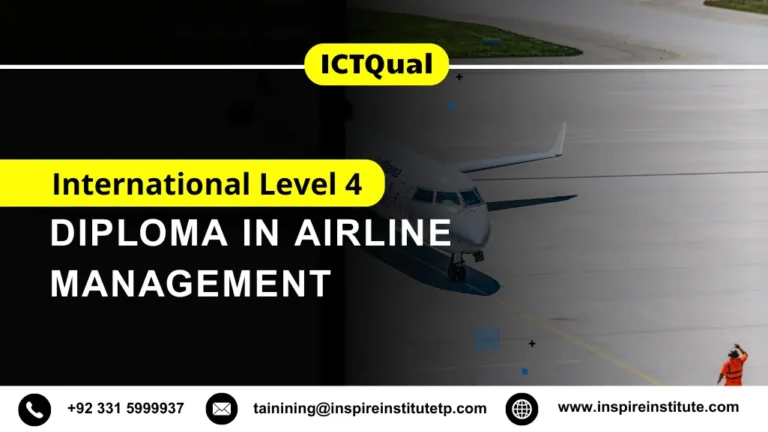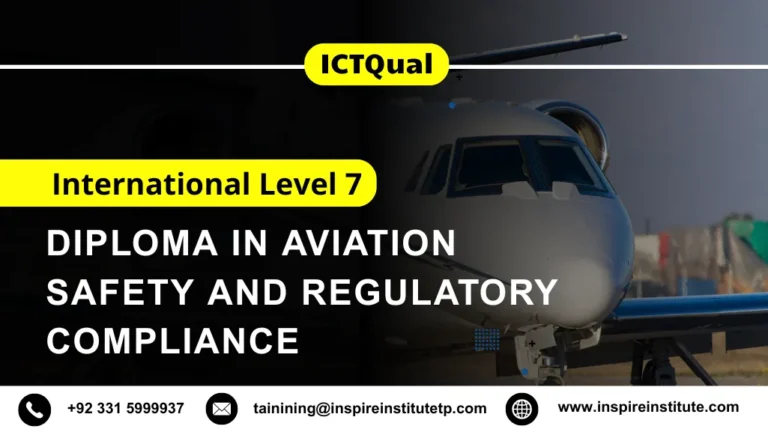ICTQual International Level 5 Diploma in Aviation Management
The ICTQual International Level 5 Diploma in Aviation Management is a globally recognized qualification designed for learners who aspire to excel in the dynamic aviation industry. This advanced aviation management course provides a comprehensive understanding of airport and airline management, equipping learners with the skills required to take on supervisory and managerial roles in international aviation.
Building on foundational knowledge, the diploma focuses on aviation operations and safety training, airline business strategy, and aviation law and regulatory compliance. Learners gain expertise in aviation crisis management, customer service excellence, and sustainable aviation practices—critical areas for today’s competitive global sector. The program emphasizes aviation leadership qualification standards, preparing graduates to manage complex aviation environments with confidence and professionalism.
Designed for both aspiring professionals and experienced learners, this aviation management training program offers practical insights into airport planning, financial management, and organizational leadership. By completing this aviation industry recognized diploma, learners open doors to global aviation career pathways, including roles in airport operations, airline services, regulatory bodies, and corporate aviation management.
The ICTQual International Level 5 Diploma in Aviation Management is more than just a qualification—it is a career advancement program that empowers learners with aviation management skills development tailored to international standards. Whether you aim to strengthen your expertise or transition into leadership, this international aviation qualification provides the knowledge, credibility, and global recognition needed to succeed in the aviation industry.
Why Choose this Qualification
The ICTQual International Level 5 Diploma in Aviation Management offers a unique blend of academic knowledge and practical skills tailored to the aviation sector. It is internationally recognized, industry-relevant, and designed to open doors to diverse career opportunities. Learners benefit from advanced training in operations, safety, leadership, and strategy, making this qualification a powerful step toward global aviation success.
Industry Recognition and Global Standards
- Aligned with international vocational and professional benchmarks.
- Recognized by employers across airports, airlines, and aviation services worldwide.
- Provides credibility for career mobility in global aviation markets.
- Builds confidence through compliance with ICAO and IATA standards.
- Offers a qualification valued by both public and private aviation organizations.
- Enhances employability in competitive international aviation sectors.
- Demonstrates commitment to professional excellence.
Comprehensive Curriculum and Skill Development
- Covers airport operations, airline strategy, and aviation safety management.
- Includes modules on regulatory compliance and aviation law.
- Focuses on customer service excellence and passenger experience.
- Provides training in financial planning and airport business development.
- Integrates sustainability and environmental management in aviation.
- Develops leadership and human resource management skills.
- Offers practical insights into crisis and risk management.
Career Advancement Opportunities
- Prepares learners for supervisory and managerial roles in aviation.
- Opens pathways into airport operations, airline services, and corporate aviation.
- Supports progression into specialized aviation sectors (cargo, security, IT).
- Enhances prospects for international aviation consultancy roles.
- Builds readiness for leadership positions in regulatory bodies.
- Strengthens employability in both public and private aviation organizations.
- Provides a foundation for lifelong professional development.
Flexibility and Accessibility
- Suitable for both new entrants and experienced professionals.
- Accepts learners with Level 4 qualifications or equivalent experience.
- Offers flexible study modes (full-time, part-time, distance learning).
- Accessible to mature learners with industry experience.
- Designed to accommodate diverse international audiences.
- Provides online resources and blended learning options.
- Ensures adaptability to different career stages.
Professional Development and Certifications
- Supports progression into IATA, ICAO, and ACI certifications.
- Encourages continuous learning in aviation safety and compliance.
- Offers pathways into leadership and management diplomas.
- Provides opportunities for specialized training in aviation sustainability.
- Builds expertise in emergency planning and crisis response.
- Enhances professional credibility through recognized certifications.
- Strengthens global career mobility through additional qualifications.
Practical Relevance and Real-World Application
- Designed with input from aviation industry experts.
- Focuses on real-world challenges in airport and airline management.
- Provides case studies and practical scenarios for applied learning.
- Encourages problem-solving and analytical thinking.
- Builds skills directly transferable to aviation workplaces.
- Enhances decision-making in complex aviation environments.
- Ensures graduates are job-ready upon completion.
Course Overview
UK based Qualification
Study Units: 6 Units
Evidence & Assignment Based
Course Level: Level 5
Qualification Structure
This qualification, the ICTQual International Level 5 Diploma in Aviation Management, consists of 6 mandatory units.
- Advanced Airline Operations and Network Planning
- Airport Commercial Management and Development
- Aviation Safety Systems and Quality Assurance
- Human Resource Management in Aviation
- Financial and Strategic Management in Aviation
- Sustainable Practices and Environmental Management in Aviation
Who Should Take This Course
The ICTQual International Level 5 Diploma in Aviation Management is designed for individuals who aspire to build or advance their careers in the global aviation sector. Whether you are a new entrant seeking structured knowledge or an experienced professional aiming for leadership, this qualification provides the skills, recognition, and pathways needed to succeed.
Aspiring Aviation Professionals
- Individuals passionate about starting a career in aviation management.
- Learners seeking structured training in airport and airline operations.
- Those aiming to enter supervisory roles in aviation services.
- Students who want to gain international recognition in aviation.
- Young professionals looking for a career-focused qualification.
- Learners motivated to work in a dynamic, global industry.
- Candidates seeking a vocational alternative to traditional academic degrees.
Current Aviation Employees
- Airport staff aiming to progress into management positions.
- Airline employees seeking to expand their operational knowledge.
- Ground handling and customer service staff aspiring to leadership roles.
- Aviation security and compliance officers wanting formal qualifications.
- Cargo and logistics staff aiming to move into supervisory positions.
- Employees seeking career mobility across international airports.
- Professionals wanting to strengthen their industry credibility.
Mature Learners and Career Changers
- Individuals aged 21+ with relevant work experience in aviation or management.
- Professionals from logistics, transport, or hospitality transitioning into aviation.
- Career changers seeking entry into a high-growth global industry.
- Managers from other sectors wanting to specialize in aviation leadership.
- Learners without formal Level 4 qualifications but with practical experience.
- Those seeking recognition of prior learning and industry expertise.
- Professionals aiming to diversify their career portfolio.
International Learners
- Students from diverse global backgrounds seeking an internationally recognized qualification.
- Learners aiming to work in airports and airlines worldwide.
- Professionals seeking mobility across different aviation markets.
- Candidates requiring a qualification aligned with ICAO and IATA standards.
- Learners interested in sustainable and innovative aviation practices.
- Individuals seeking exposure to global aviation regulations and compliance.
- Students motivated by cross-cultural career opportunities.
Ambitious Leaders and Managers
- Professionals aiming for leadership roles in airport or airline management.
- Individuals seeking to develop advanced decision-making and problem-solving skills.
- Managers wanting to strengthen their strategic planning capabilities.
- Learners motivated to lead teams in complex aviation environments.
- Candidates aspiring to roles in aviation consultancy or project management.
- Professionals aiming to influence aviation policy and regulatory frameworks.
- Leaders seeking to drive innovation and sustainability in aviation.
✅ Summary:
Course Benefits
The ICTQual International Level 5 Diploma in Aviation Management is designed to empower learners with advanced knowledge, practical skills, and international credibility. It provides a strong foundation for supervisory and managerial roles in aviation, while also opening pathways into specialized sectors and professional certifications.
Global Recognition and Credibility
- Internationally recognized qualification valued by aviation employers worldwide.
- Aligned with ICAO, IATA, and ACI standards for global compliance.
- Enhances employability across airports, airlines, and aviation services.
- Provides credibility for career mobility in international aviation markets.
- Demonstrates commitment to professional excellence in aviation.
- Strengthens learner profiles for global recruitment opportunities.
- Builds trust with employers through industry-standard training.
Comprehensive Knowledge and Skills
- Covers airport operations, airline strategy, and aviation safety management.
- Provides expertise in aviation law and regulatory compliance.
- Develops leadership and human resource management skills.
- Enhances financial planning and airport business development knowledge.
- Focuses on customer service excellence and passenger experience.
- Integrates sustainability and environmental management practices.
- Builds analytical and problem-solving skills for complex aviation challenges.
Career Advancement Opportunities
- Prepares learners for supervisory and managerial roles in aviation.
- Opens pathways into airport operations, airline services, and corporate aviation.
- Supports progression into specialized aviation sectors (cargo, security, IT).
- Strengthens employability in both public and private aviation organizations.
- Provides readiness for consultancy and project management roles.
- Enhances prospects for leadership positions in regulatory bodies.
- Builds a foundation for lifelong professional development.
Flexibility and Accessibility
- Suitable for both new entrants and experienced professionals.
- Accepts learners with Level 4 qualifications or equivalent experience.
- Offers flexible study modes (full-time, part-time, distance learning).
- Accessible to mature learners with industry experience.
- Designed for diverse international audiences.
- Provides online resources and blended learning options.
- Ensures adaptability to different career stages.
Professional Development Pathways
- Supports progression into IATA, ICAO, and ACI certifications.
- Encourages continuous learning in aviation safety and compliance.
- Offers specialized training in aviation sustainability and crisis management.
- Builds expertise in emergency planning and risk management.
- Provides opportunities for leadership and management diplomas.
- Enhances professional credibility through recognized certifications.
- Strengthens global career mobility through additional qualifications.
Practical Relevance and Real-World Application
- Designed with input from aviation industry experts.
- Focuses on real-world challenges in airport and airline management.
- Provides case studies and practical scenarios for applied learning.
- Encourages problem-solving and analytical thinking.
- Builds skills directly transferable to aviation workplaces.
- Enhances decision-making in complex aviation environments.
- Ensures graduates are job-ready upon completion.
Eligibility Criteria:
Age: Learners must be 18 years or older at the time of enrolment. This ensures maturity and readiness for advanced study and mid‑management level responsibilities.
Educational Background:LLearners should have completed A Level 4 Diploma in Aviation Management (or an equivalent qualification in aviation, travel, tourism, logistics, or business).Alternatively, learners with secondary education plus substantial industry experience may also be considered.
Work Experience:While not mandatory, prior experience in aviation operations, customer service, airport or airline administration, or logistics is highly beneficial.Learners with supervisory or team‑leading experience will find the course content especially relevant.
English Language Proficiency:
Since the programme is delivered in English, learners must demonstrate strong written and spoken English skills.A level equivalent to CEFR B2 or above is recommended to ensure learners can engage with academic content, complete assessments, and participate in professional discussions effectively.
Other Requirements: Access to a reliable internet connection and a digital device (laptop, tablet, or desktop) is essential for online study and assessments.Learners should have basic IT literacy to navigate e‑learning platforms, submit assignments, and communicate effectively.
Future progression
The ICTQual International Level 5 Diploma in Aviation Management equips learners with advanced knowledge in airport operations, airline strategy, aviation safety, and leadership. Upon completion, graduates can pursue supervisory, managerial, and specialist roles in aviation, as well as professional certifications and sector-specific opportunities.
Progression into Airport Operations & Management
- Duty Manager: Oversee daily airport operations and ensure smooth passenger flow.
- Terminal Operations Supervisor: Manage terminal staff and passenger services.
- Ground Handling Coordinator: Supervise baggage, cargo, and ramp operations.
- Airside Operations Officer: Monitor runway, taxiway, and apron safety compliance.
- Customer Service Manager: Lead passenger-facing teams to enhance service quality.
- Security & Compliance Officer: Ensure adherence to aviation safety regulations.
- Operations Planner: Develop schedules and contingency plans for airport activities.
Progression into Airline & Aviation Services
- Airline Station Manager: Represent the airline at the airport, managing staff and operations.
- Flight Operations Coordinator: Support crew scheduling, dispatch, and logistics.
- Cabin Services Supervisor: Oversee inflight service standards and crew performance.
- Cargo Operations Manager: Manage freight handling, documentation, and logistics.
- Customer Experience Specialist: Enhance passenger satisfaction across airline touchpoints.
- Revenue & Yield Analyst: Optimize ticket pricing and revenue streams.
- Ground Services Manager: Coordinate check-in, boarding, and passenger assistance.
Progression into International Aviation & Regulatory Bodies
- ICAO/CAA Liaison Officer: Work with civil aviation authorities on compliance and policy.
- Safety & Quality Auditor: Conduct audits for international aviation standards.
- Aviation Policy Analyst: Contribute to shaping airport and airline regulations.
- Training & Development Specialist: Deliver aviation compliance and safety training.
- Airport Certification Officer: Support airports in meeting international accreditation standards.
- Environmental & Sustainability Officer: Implement green initiatives in aviation.
- Risk & Crisis Management Specialist: Develop emergency response frameworks.
Progression into Corporate & Business Aviation Management
- Business Development Manager: Expand airport commercial activities (retail, concessions).
- Contracts & Procurement Officer: Manage supplier agreements and vendor relations.
- Aviation Project Manager: Lead infrastructure or technology upgrade projects.
- Financial Analyst (Aviation): Handle budgeting, forecasting, and cost control.
- Human Resources Manager: Recruit and train aviation professionals.
- Marketing & Communications Officer: Promote airport services and brand reputation.
- Strategic Planning Executive: Shape long-term airport growth strategies.
Progression into Professional Certifications & Training
- IATA Certifications: Specialize in ground operations, safety, or cargo.
- ICAO Training Programs: Gain expertise in aviation safety and regulatory compliance.
- Airport Council International (ACI) Courses: Focus on airport leadership and sustainability.
- Safety Management Systems (SMS): Certification in risk and safety frameworks.
- Emergency Planning & Crisis Response Training: Specialized aviation emergency courses.
- Leadership & Management Diplomas: Strengthen managerial skills for aviation contexts.
- Customer Service Excellence Programs: Enhance passenger engagement and service delivery.
Progression into Specialized Aviation Sectors
- Air Cargo Logistics: Move into freight forwarding and supply chain management.
- Aviation Security Management: Specialize in airport and airline security systems.
- Airport Retail & Concessions: Manage duty-free, food & beverage, and retail operations.
- Aviation IT & Systems: Work with airport technology platforms (e.g., passenger processing).
- Sustainability & Green Aviation: Focus on eco-friendly airport initiatives.
- Private & Business Aviation: Manage VIP lounges, charter services, and executive terminals.
- Training & Consultancy: Provide expertise to airports and airlines globally.







